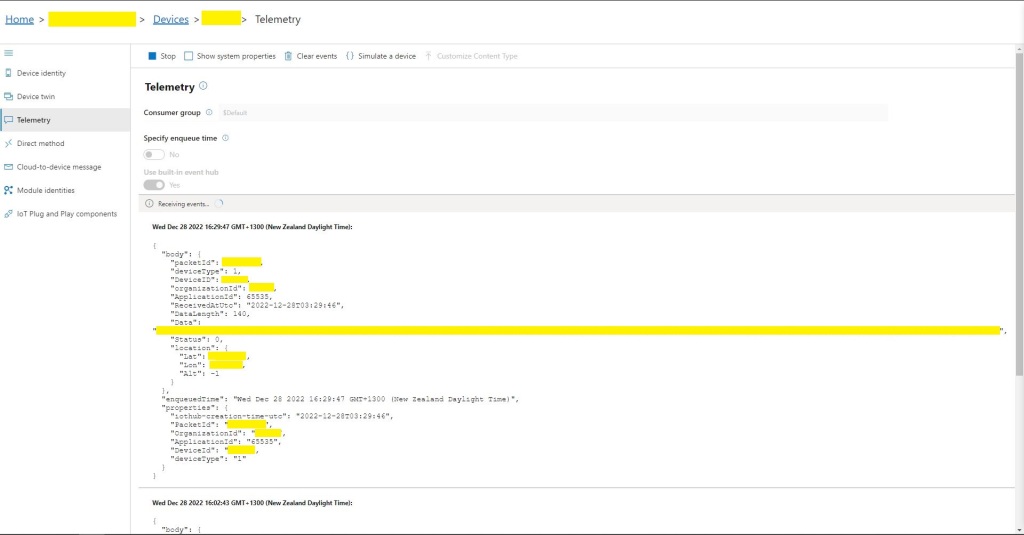My Azure IoT Hub Cloud Identity Translation Gateway will support the translation of Base64 encoded uplink payloads to Javascript Object Notation (JSON) so they can be processed by Azure IoT Hub client applications and Azure IoT Central. This PoC uses CS-Script by Oleg Shilo to transform the Swarm Eval Kit Base64 encoded JSON uplink messages.
A sample decoded (JSON) Swarm Eval Kit uplink message
{"ln":123.456,"si":0.0,"bi":0.2,"sv":0.152,"lt":-12.345,"bv":4.032,"d":1671704370,"n":2,"a":9.0,"s":1.0,"c":208.0,"r":-94,"ti":0.032}
A Webhook Delivery method forwards uplink messages to my Azure IoT Hub Cloud Identity Translation Gateway.
My first hard-coded payload formatter adds an Azure IoT Central compatible location to the telemetry event payload.
const string codeSwarmSpaceUplinkFormatterCode = @"
using Newtonsoft.Json.Linq;
public class UplinkFormatter : PayloadFormatter.ISwarmSpaceFormatterUplink
{
public JObject Evaluate(JObject telemetryEvent, string payloadBase64, byte[] payloadBytes, string payloadText, JObject payloadJson)
{
if ((payloadText != """" ) && ( payloadJson != null))
{
JObject location = new JObject() ;
location.Add(""Lat"", payloadJson.GetValue(""lt""));
location.Add(""Lon"", payloadJson.GetValue(""ln""));
location.Add(""Alt"", payloadJson.GetValue(""a""));
telemetryEvent.Add( ""location"", location);
};
return telemetryEvent;
}
}";
}
The PayloadFormatter namespace was added to reduce the length of the payload formatter C# interface declarations.
namespace PayloadFormatter
{
using Newtonsoft.Json.Linq;
public interface ISwarmSpaceFormatterUplink
{
public JObject Evaluate(JObject telemetry, string payloadBase64, byte[] payloadBytes, string payloadText, JObject payloadJson);
}
public interface ISwarmSpaceFormatterDownlink
{
public string Evaluate(JObject payloadJson, string payloadText, byte[] payloadBytes, string payloadBase64);
}
}
namespace devMobile.IoT.SwarmSpace.AzureIoT.Connector
{
using System.Threading.Tasks;
using Microsoft.Extensions.Logging;
using CSScriptLib;
using PayloadFormatter;
public interface ISwarmSpaceFormatterCache
{
public Task<ISwarmSpaceFormatterUplink> PayloadFormatterGetOrAddAsync(int userApplicationId);
}
public class SwarmSpaceFormatterCache : ISwarmSpaceFormatterCache
{
private readonly ILogger<SwarmSpaceFormatterCache> _logger;
public SwarmSpaceFormatterCache(ILogger<SwarmSpaceFormatterCache>logger)
{
_logger = logger;
}
public async Task<ISwarmSpaceFormatterUplink> PayloadFormatterGetOrAddAsync(int deviceId)
{
return CSScript.Evaluator.LoadCode<PayloadFormatter.ISwarmSpaceFormatterUplink>(codeSwarmSpaceUplinkFormatterCode);
}
...
}
The parameters of the formatter are Base64 encoded, textual and a Newtonsoft JObject representations of the uplink payload and a telemetry event populated with some uplink message metadata.
The initial “compile” of an uplink formatter was taking approximately 2.1 seconds so they will be “compiled” on demand and cached in a Dictionary with the UserApplicationId as the key. A default uplink formatter will be used when a UserApplicationId specific uplink formatter is not configured.



Pingback: Swarm Space – Uplink Payload formatter caching and files | devMobile's blog
Pingback: Myriota – Uplink Payload formatters and caching | devMobile's blog
Pingback: Myriota – Uplink Payload formatters revisited | devMobile's blog
Pingback: Myriota – Uplink Payload Formatters Test Harness | devMobile's blog
Pingback: Myriota Connector- Payload formatters revisited again | devMobile's blog